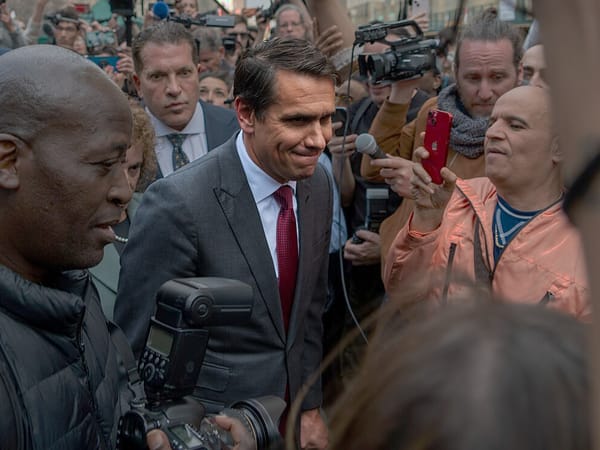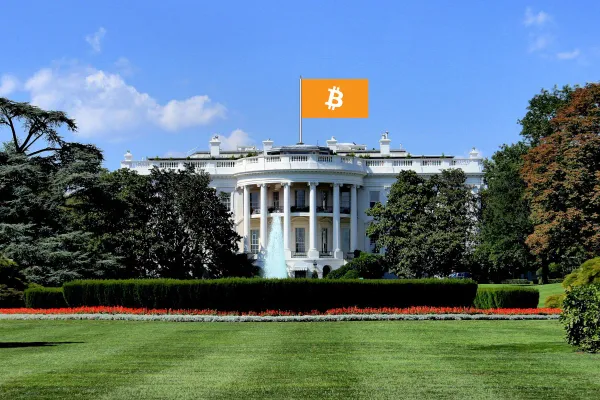I asked Popehat: Why isn't SBF in jail?
A criminal defense attorney and former federal prosecutor shares his expertise.

If the first half of my crypto-watching career required me to become an amateur financial analyst, the second has required me to become an amateur lawyer.a These days I find myself skimming through bankruptcy documents, class action complaints, and motions in criminal cases even more often than sifting through blockchain transaction logs or project whitepapers.
Recently, I've found myself with some unanswered questions about Sam Bankman-Fried's bond, and the modifications to his release conditions that have been proposed following his stunts with VPNs and Signal messages to ex-FTX employees. So, I called in the big guns.

Ken White (no relation) is a criminal defense attorney, civil litigator, and former federal prosecutor. He's also perhaps better known, at least online, as Popehat. He blogs over at , he's the operator of the huge Popehat Twitter account (inactive since the introduction of our new involuntary Twitter overlord, but active on Mastodon), and he's a co-host of the podcast. I've recommended Serious Trouble in this newsletter before; their excellent coverage of Sam Bankman-Fried's very serious trouble is illuminating and easy to understand for those of us who may not know the difference between, say, federal and state bail systems.
White was kind enough to lend me some of his time so I could pick his brain.
Why haven't the US Attorneys filed a motion for SBF's bond to be revoked?
Even after it was discovered that SBF had contacted a former FTX employee via the Signal encrypted messaging app to suggest that they "have a constructive relationship, use each other as resources when possible, or at least vet things with each other", and then it was discovered that SBF had been using a virtual private network (VPN) to spoof his location or obfuscate his online activities, the US Attorneys (USAs) have not requested that SBF be returned to custody. They have instead proposed a set of restrictions on his Internet and cell phone use, with carve-outs permitting SBF to send emails, access the Internet in order to review discovery, and things like that.
The primary question on my mind (and judging from Twitter, on everyone's mind) is: why is Sam Bankman-Fried still sitting in his computer chair in Palo Alto rather than in a cell in New York? We could certainly debate the justice of pre-trial detention, but the fact of the matter is that a hell of a lot of people have been detained pre-trial for a lot less serious crimes than SBF.
There are, of course, the obvious factors that SBF is white, wealthy (or at least formerly so), the son of two Stanford lawyers, and accused of a white-collar crime, and those have clearly influenced his treatment. But there are certainly other factors that are being considered by both the judge and the USAs, which White explained to me.
For one, making sure a defendant who is in custody can properly prepare their defense is painful and introduces a lot of delay. "It's hard to exaggerate how difficult it is to run a defense in a case that's complicated, let alone this complicated, with someone who's in custody," said White. "It's nearly impossible, and a judge is going to give them huge leeway with how much time they need." AUSA Nicolas Roos claims that in SBF's case, they would need to bring a "suitcase-sized server" into the jail to allow SBF to review FTX databases. While I doubt the physical size of the server is truly the crux of the problem, it is accurate that putting SBF back in the slammer would likely introduce substantial delay and generally make things difficult for all parties involved.
SBF and the US Attorneys also may have come to an agreement on release conditions in exchange for waiving extradition from The Bahamas. SBF hasn't technically violated the terms of his release (unless the USAs can convince a judge that using a VPN was a violation of his interim restriction from using encrypted communications, but that seems to me like a stretch), and White explained that although it's not likely that there is a written agreement prohibiting the USAs from modifying the terms after the fact, people would probably be a lot less likely to cut deals like this if USAs routinely turned around and changed the terms once the defendant set foot in the United States.
Prosecutors might believe that being confined to his parents home might also help SBF begin to consider a plea deal, said White, assuming they think there's a chance SBF might be swayed by proximity to family or his lawyers.
Finally, White echoed my own suspicions: SBF seems so determined to dig himself a deeper hole by talking to journalists, writing blog posts, and sending private messages that the USAs may be hesitant to take away the proverbial shovel. "He's so consistently incriminating himself, revealing things, making things worse for himself, possibly revealing information that leads them to new avenues of investigation, that they kind of thought 'you know what, it's in our interest for this dude to be out running his mouth,'" said White. There is clearly some risk that SBF might commit new crimes, but the USAs may be rolling the dice that the types of crimes he might commit are unlikely to be of the sort that might present a serious danger to those around him, and that in fact his attempts to do crimes might serve to lead officials to as-yet undiscovered evidence or even assets.
Might the judge throw SBF back in jail even though it wasn't requested by the USAs?
Judge Kaplan seemed a little miffed that SBF is out on bond and causing trouble, potentially even attempting to tamper with witnesses. "Why am I being asked to turn him loose in this garden of electronic devices?" asked Kaplan during a very brief hearing on February 17.1 He observed that the hearing was not intended to discuss whether SBF's bail would be revoked, but remarked that "it could get there, conceivably".
No decisions were made, but Kaplan did float the idea of having a tech expert brought in that he could consult as needed. He also seemed to get the message through to SBF's attorneys that they need to propose actual restrictions that might keep SBF out of further trouble. So far, they've just been fiddling with the list of proposed authorized messaging applications, but not meaningfully engaging with the VPN issue.
I asked White if he thought there was a chance the judge might just yank SBF back into custody even if it wasn't requested by the USAs. He said it was possible, particularly if SBF continues to misbehave, but that "federal judges tend to bark a lot and not bite as much." Despite perhaps a propensity among federal judges to yell at the Department of Justice, White said, the judges will also often ultimately come out in their favor regardless.
Are Internet use restrictions unusual as a condition of release? Is it weird that SBF wasn't given one to begin with?
White explained that Internet use restrictions are indeed fairly commonplace as pre-trial release conditions when it comes to cybercrime cases. That said, in SBF's case, the alleged crime was really more to do with the fraudulent web of organizations he created rather than his specific use of computers to perpetrate crimes, and so White wasn't terribly surprised to see that SBF was originally released without a computer-related restriction. He pointed to charges like computer-based harassment or committing direct fraud via a computer as ones that might earn a defendant such a restriction right out of the gate.
I also asked if judges tended to work from a preset list of restrictions or if they had broad leeway to impose any restrictions they see fit. Yes to both, said White, who explained that judges are given a lot of discretion to set bail conditions, even ones that might pose Constitutional problems in other contexts. Because pre-trial release is "sort of an act of grace by the court, and you don't have a right to be out, [judges] can set conditions that may otherwise infringe on your rights": for example, they can order someone not to associate with other people, restrict their travel and movement, or impose computer use restrictions.
White also explained that there are indeed also preset checklists of bond conditions that are routinely imposed, which serve as a starting point. This gave me the opportunity to satisfy my own curiosity around why the judge seemed to find it necessary to impose a firearms restriction for SBF, who to my knowledge hasn't been known to own or use firearms. Perhaps he secretly has a thing for guns? No, probably not. White explained that it's common to see some standard conditions checked off, even if there's no specific concern that would seem to require it: "I think it's just purely 'we want to say that we're keeping an eye on him and he's not getting into anything bad.'"

Is it going to be a problem that the judge isn't very tech savvy?
When the topic of encrypted messaging came up in the context of SBF's Signal chats, Judge Kaplan commented, "What does [the US Attorney's Office] mean by encrypted? I've read spy novels…"
I wondered if this apparent lack of familiarity with technology might present an issue. Certainly you wouldn't expect the judge to know the ins and outs of, say, blockchain smart contracts, but it seems it would be useful for the judge to have a fairly base-level understanding of technology. White remarked that Judge Kaplan's level of tech understanding was "well within the curve of what you expect from federal judges" (who he also noted often tend to be older — Kaplan is 78).
I briefly entertained a worry that, with Judge Kaplan requesting SBF's team be the ones to find and pay for a technology consultant, in some sort of sly move they might be able to find someone who they could pay to tell the judge that "no, your honor, VPNs are only used for watching football" or something similarly ludicrous. "You're never going to have a situation where one side or the other gets unilateral ex parte communications," White reassured me.
The parties and the judge will hash out SBF's new bond conditions soon. Hopefully SBF is getting in all the Storybook Brawl he can muster before then, lest it become unavailable to him once again. You might think that a man who described his lack of Internet access as unbearable, threatening to make him go insane, and "like 80% of the total cost of being in prison"2 (during the nine days he spent in jail in The Bahamas) might be more careful not to jeopardize it.
Meanwhile, the USAs have indicted SBF on four additional charges including conspiracy to operate an unlicensed money-transmitting business and conspiracy to commit bank fraud. I'll be writing more on this development very shortly.
Huge thanks to Ken White for sparing the time to walk me through the questions I'd collected while observing the criminal case against SBF to date. Anyone who finds the legal ins and outs of cases like this one as fascinating as I do should definitely subscribe to his podcast and blog, where there is far more of that to be found.




